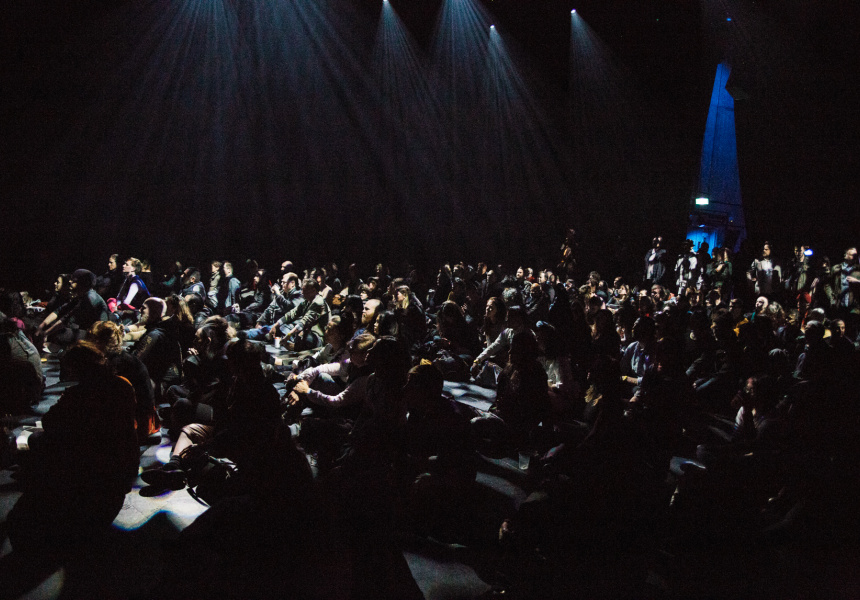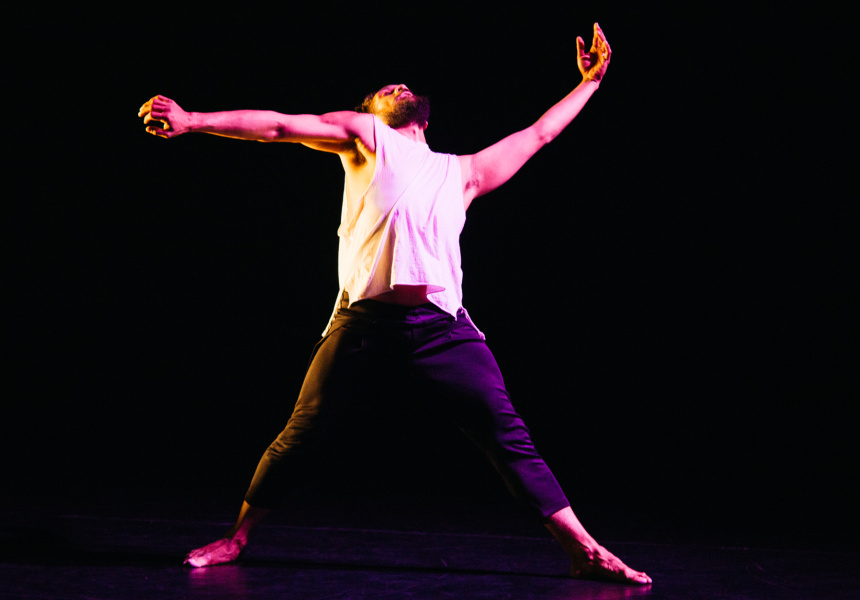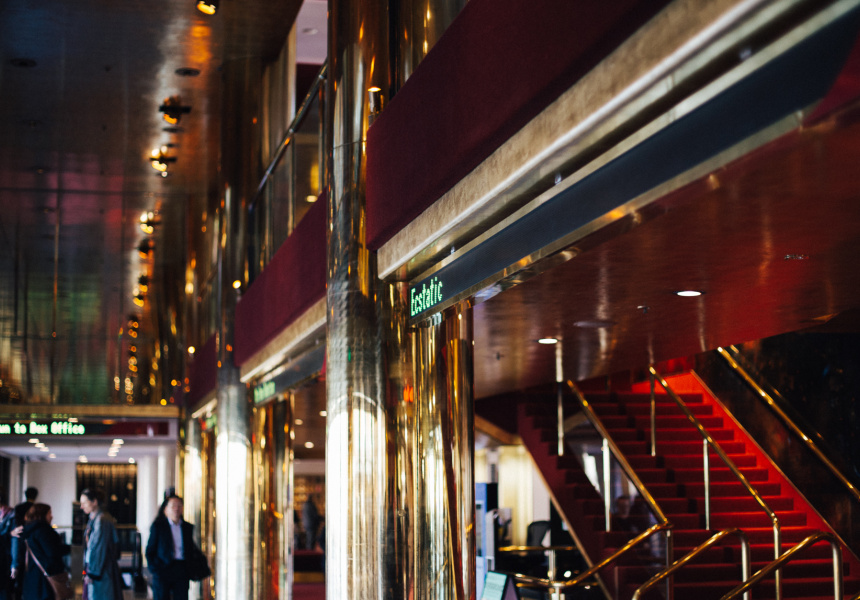Supersense punter one: “Where did you go?”
Supersense punter two: “I had to get out of there. That music reminds me of coming off anti-depressants while the next-door neighbours mow the lawn.”
I overheard that exchange in the Playhouse Theatre lobby, deep inside the Arts Centre, after a performance by Japanese musician and songwriter Keiji Haino on Friday night. I’d been struggling to think up ways to describe Haino’s storm of feedback, static and squealing circuitry. The best I could come up with is that it was like swimming in an atomic raincloud.
The Playhouse Theatre is located deep below the spire. You have to wind down several sets of stairs and lushly carpeted halls to get there, so it feels like uncovering a secret. It’s just one of the back theatres, rehearsal rooms, foyers and lobbies the Arts Centre opens up for Supersense, a three-day “festival of the ecstatic”. This year – the festival’s second instalment – asks, “how do we achieve and seek out ecstatic states” in a diverse and contemporary society, says co-curator and artist Sophia Brous.
Never miss a Melbourne moment. Make sure you're subscribed to our newsletter today.
SUBSCRIBE NOWYou could tell that many left the Playhouse after Haino’s set feeling discombobulated but totally energised. When things get that loud and menacing it can feel like plunging into icy water: painful at first but exhilarating once you surrender to it. For that one punter Haino brought nothing but psychic pain. It just goes to show: transcendence is a very subjective thing. But that’s the beauty of Supersense and its ambition – you can stumble upon something meditative, cerebral or off-the-charts intense depending on which path you choose. The art and music spans a vast spectrum of time and space, so you’re bound to find bliss somewhere, if you’re patient enough.
Friday night kicked off with Acid Mothers Temple & the Melting Paraiso UFO, a group of aging Japanese hippies holding heavy amorphous psych rock together with thick bass lines. Basically, they sounded exactly the way their name does.
Free jazz improviser Zeena Parkins set up in the Fairfax Theatre promising to re-imagine the harp as “sound machine of limitless capacity”. Before that, she sent us into trance-like states by e-bowing the strings of a grand piano, getting it to vibrate like a cosmic abacus.
The Master Musicians of the Jajouka are from the Rif mountains in northern Morocco. Leader Bachir Attar assured us they “didn’t want to be famous” but would appreciate it if someone would post a video on their Facebook (“if they could find it”) because they’d never played on a stage like this before. This music has been around for 1300 years or so. The masters looked a little awkward to begin with but you got the sense they relaxed about halfway through, realising a good chunk of the crowd had been joyfully hypnotised.
After Keiji’s noise assault I was ready to collapse in a chair and count the glowing dots on the lobby wall until my synapses started firing regularly again. Instead I delved into the breakbeat cello compositions of Oliver Coats. Big mistake. The music was very dark, but it was the dystopian RPG projections that got to me. At one stage a projected message seemed to be chiding the audience for having our hands on our phone (I did) and warned us we might “die by the glow of a laptop screen”(I might).
I escaped up the stairs to Exo-Tech where I found Sophia Brous in a circular jazz puddle with Melbourne’s improvising elite. She was up there locked in a sort of vocal standoff opposite Kimbra, which sounded halfway between a schoolyard chant and reverb-drenched scat battle. Much more energising than Oliver Coats. There were a couple of instrumental breakdowns proving the old axiom that intergalactic jazz funk might be more fun to play than listen to. But when everyone locked in together there were some truly ecstatic passages.
Severed Heads occupied Saturday’s opening slot. Those guys have been making electro-punk since the late ’70s. And, in a festival of Very Serious Art, it was refreshing to see two old clubbers refuse to take their job seriously. Between bursts of euphoric trance, smashed calculator noise and Pet Shop Boys-esque pop they kept acting like embarrassing uncles: taking badly timed phone photos, and for some reason, pranking each other with a toy rat.
Memory Field, Bangarra Dance Theatre’s Waangenga Blanco’s collaboration with drummer Laurence Pike, had a simple set up: just a spotlight under which Blanco danced, and a drum kit for Pike. It was all they needed. Pike pelted out complex rhythms, working disparate time signatures with each of his limbs. Blanco stomped, stiffened, shook, leapt, spun, and melted across the stage. Forty-five minutes of non-stop physicality.
“Yoiking” is sort of a Scandinavian form of yodelling, and it’s one of the longest-living music traditions in the world. Ànde Sombay is a master Yoiker. His voice became effortlessly guttural or ethereal depending on whether he was embodying the spirit of a bear, a reindeer, a wolf or an insect. At one stage he explained how magpies are shamanistic birds that carry the dark end of the rainbow in their tails. And how mosquitos are the most alive creatures on Earth. Also how garbage trucks would be much more efficient if they flew like insects. Which is true. Basically, he came across as a guy with a much more complex understanding of nature than most. It was nice to get a fresh perspective.
Then it was back into The State Theatre where Sophia Brous had formed a new jazz crew for Dream Machine. This time Zeena Parkins was lending a hand on harp. We kept getting warned about the “extreme strobe”. If you lay back and closed your eyes the lights would blast through your eyelids and form pixelated disco patterns in your retina.
Alice Coltrane Turiyasangitnanda was one of the most innovative composers in history. She abandoned her secular life in the mid-70s to start her own ashram and managed to fuse Indian music traditions with experimental jazz in a way that sounds truly ecstatic. The music feels more organic than, say, the sitar experiments of the Beatles or the Stones because Alice was 100 per cent absorbed in her ashram existence: this wasn’t cultural tourism. And, aside from a few bass problems, her sound was lovingly and faithfully recreated in Hamer Hall by the Sai Anantam Ashram Singers alongside long-time collaborator Reggie Workman. It’s music that’s designed to be participatory (a bit like the Jajoukan performance) and while we were all given prayer books and encouraged to clap along, you got the feeling people were content to just sit back and appreciate.
Overground, which happened on Sunday, billed itself as Supersense’s
“festival within a festival”, focused on improvisation and collaboration. One of the best parts of Supersense is how excited international guests seem to be about putting something together with local artists. Improvisation is supposed to be like conversation, and it didn’t feel as if the more experienced musicians talked over the younger ones here. Local saxophone maverick Scott McConnachie lost his shit (and his shirt) onstage with Acid Mothers Temple, Jeremy Gustin and Dave Harrington. It sounded a bit like the sax scene in Lost Highway shot through a kaleidoscope.
Some find transcendence at the ashram, some find it in a dream machine, others in the flash of a magpie wing. Personally I find it in the music of Spiritualized. Jason Pierce, the band’s English frontman, rewrites gospel tunes so they’re about opiate-laced longing and despair, then sends them into outer space using walls of distortion and tremolo. No stage banter, no rock posturing, just song after song of shimmering, symphonic melancholy to set your soul on fire.
For Melbourne’s latest, subscribe to the Broadsheet newsletter.



